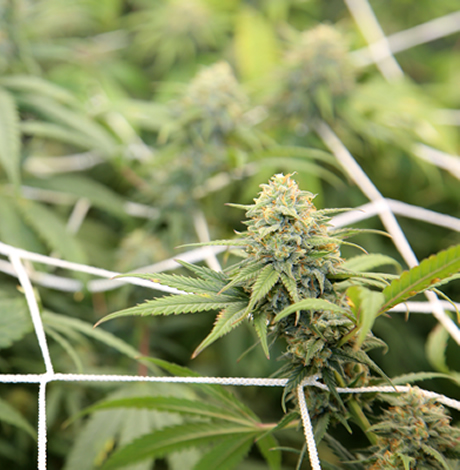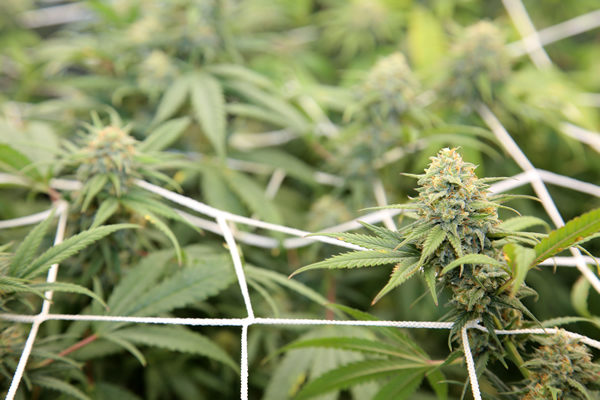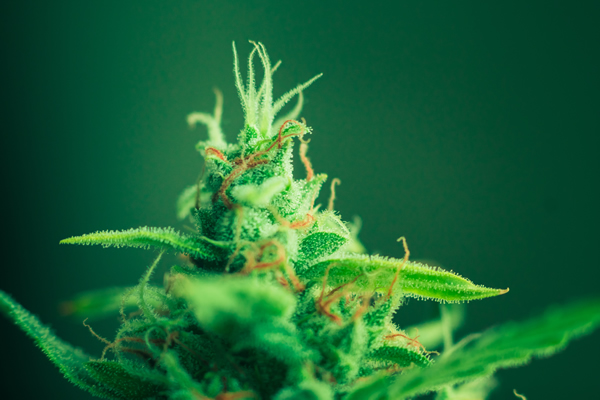Cannabis Culture
Cannabis Culture
Fewer marijuana seizures but more arrests


DEA: Fewer marijuana seizures but more arrests
Federal agents seized fewer total marijuana plants in 2018, but made more arrests for cannabis-related offenses, according to annual data compiled by the U.S. Drug Enforcement Administration.
According to figures published in the DEA’s Domestic Cannabis Eradication/Suppression Statistical Report, the agency and its law enforcement partners confiscated an estimated 2.82 million marijuana plants nationwide in 2018. This total represents a 17 percent decline from the agency’s 2017 totals and a 66 percent decline since 2016.
Driving much of the year-over-year decline was a nearly 40 percent reduction in the seizure of outdoor plants in California, which fell from 2.24 million in 2017 to 1.4 million in 2018. Adult-use retail sales of cannabis began in California in 2018.
Separate data published recently in the journal Ecological Economics identifies an association between the passage of adult-use marijuana regulatory laws and the reduction in the number of grow operations in national forests.
However, while the total number of DEA-seized plants fell in 2018, seizures of indoor cannabis plants nearly doubled – rising from 304,000 plants in 2017 to just under 600,000 in 2018. The agency also reported 5,632 marijuana-related arrests in 2018, a 20 percent increase over 2017 figures. The agency reported over $52 million in confiscated assets in 2018, more than twice what the agency reported in 2017.
Jurisdictions reporting the greatest number of total plant seizures in 2018 were California (1.8 million marijuana plants seized), Kentucky (418,000), Washington (112,000), Mississippi (70,000), and West Virginia (68,000).
Senate banking committee takes up cannabis reform
Members of the United States Senate Committee on Banking, Housing, and Urban Affairs were scheduled to hear testimony this week regarding the need to provide greater access to financial services for state-licensed marijuana-related businesses.
The Senate hearing, titled “Challenges for Cannabis and Banking: Outside Perspectives,” marks the first time that members of the Senate have officially considered the need for marijuana-related banking reform.
Federal law and regulations currently discourage banks and other financial institutions from working directly with state-licensed cannabis businesses. According to recently published data from the Treasury Department, fewer than 500 financial institutions nationwide currently provide services to cannabis-specific establishments.
Members of the House Committee on Financial Services, Subcommittee on Consumer Protections and Financial Institutions previously heard testimony on the issue in February.
Legislation (HR 1595 | S 1200 – The SAFE Banking Act) is pending in both chambers to create new federal protections for financial operators who work with state-compliant marijuana businesses. The House version of the Act, which was passed out of Committee earlier this year, has more than 200 congressional co-sponsors while the Senate version has 31 cosponsors.
Wisc. sees dramatic racial disparity in marijuana arrests
MADISON, Wisc. — African Americans in Wisconsin are four times more likely than whites to be arrested for violating marijuana possession laws, according to an analysis of 2018 arrest data by the Wisconsin Center for Investigative Journalism.
The finding is consistent with those of prior analyses. According to a nationwide study by the American Civil Liberties Union, “[O]n average, a Black person is 3.73 times more likely to be arrested for marijuana possession than a white person, even though Blacks and whites use marijuana at similar rates.”
The Center’s analysis also reported a slight increase in total marijuana possession arrests in Wisconsin in 2018 to just under 15,000. The counties with the highest percentages of possession arrests per 1,000 people are Green Lake (6.4), Walworth (5.4), Dunn (5.3), Monroe (5.1), and Marinette (5.0). Under state law, low-level marijuana possession offenses are classified as criminal misdemeanors, punishable by up to six-months in jail and a $1,000 fine.
Commenting on the state-specific study, University of Wisconsin-Madison sociology professor Pamela Oliver said: “The only possibility for these statistics to happen is for police to be stopping blacks more than whites. … We know the usage patterns are not different, so if you’re generating a difference in arrests, it has to be differential policing.”
Democratic Gov. Tony Evers has proposed eliminating both criminal and civil penalties for minor marijuana possession offenses, stating, “[W]e are spending too much money prosecuting and incarcerating people – and often persons of color – for non-violent crimes related to possessing small amounts of marijuana.”
Cannabis Culture news in the Blade is provided in partnership with NORML. For more information, visit norml.org.

Democratic Gov. Michelle Lujan Grisham earlier this month signed two separate measures into law amending the state’s marijuana policies. The first measure (House Bill 2) legalizes and regulates marijuana possession, production, and sales for adults. The second measure (Senate Bill 2) facilitates the automatic review and expungement of the records of those convicted of low-level marijuana offenses.
Lawmakers approved both bills during a special legislative session demanded by Gov. Lujan Grisham, who had been a vocal proponent of the reforms.
NORML State Policies Manager Carly Wolf said: “This is a day to celebrate! New Mexico will greatly benefit from this new revenue stream and the creation of thousands of jobs. Most notably though, legalization will spare thousands of otherwise law-abiding residents from arrest and a criminal record, and the state’s new expungement law will help provide relief to many who are suffering from the stigma and other collateral consequences associated with a prior marijuana conviction.”
The adult-use measure (House Bill 2) permits those ages 21 and older to legally purchase up to two ounces of marijuana and/or up to 16 grams of cannabis extract from licensed retailers. It also permits adults to home-cultivate up to six mature plants for their own personal use. Retail sales would begin by April 2022.
The expungement measure (Senate Bill 2) stipulates that those with past convictions for offenses made legal under this act are eligible for automatic expungement of their records. Those currently incarcerated for such offenses are eligible for a dismissal of their sentence. It’s estimated that over 150,000 New Mexico residents are eligible for automatic expungement under this measure, according to the Department of Public Safety.
Cannabis Culture news in the Blade is provided in partnership with NORML. Visit norml.org for more information.
Cannabis Culture
Delaware cannabis activists take on corporate marijuana
Criticism from medical marijuana operators claimed that HB150 offers too many cultivation and retail licenses

As the country moves forward with sweeping changes in cannabis policy reform, locals in Delaware are tangling with corporate, multi-state medical marijuana permit holders to pass a bill for full legalization.
Adult-use activists and registered medical patients were stunned to hear opposing testimony from Delaware’s medical marijuana operators. Patients already deal with limited access and costly products. Now, many see the established industry voicing opposition as simply obstructing the progress of adult-use legislation. In response, some patients are now staging a boycott of the regulated dispensaries.
During the first committee hearing for HB150, Delaware’s adult-use bill, four of the state’s six currently licensed, multi-million dollar medical cannabis facilities offered negative testimony.
Zoë Patchell, executive director of Delaware CAN responded: “This market belongs to the long-time consumers, patients, and activists. We create the demand, we’ve been the ones driving the reform efforts, and we pay the prices at dispensaries. Cannabis is more than a market – cannabis is a community. These companies cannot reasonably fathom that we are going to purchase cannabis from any entity that has proven to put profits over patients. And now they seem willing to put consumers’ lives and freedom at risk just to hold out for an unfair advantage in the industry.”
These included publicly traded Columbia Care, “Fresh Delaware” aka CCRI, CannTech Research Inc., and the owner of EZY Venture aka “The Farm.”
They all went on record condemning HB150, and pushing a false narrative about oversupply. The core demand from the permit cartel was some protection for their private business interests with guaranteed adult-use licenses.
Criticism from the medical marijuana operators claimed that HB150 offers too many new cultivation and retail licenses, underlined by deep yet unfounded fears that the new competition would put their companies out of business.
Patchell noted, “We are not going to sit back while multi-state corporate entities, that already monopolize East Coast medical markets, work to undermine our social equity and micro-license provisions.”
Cannabis Culture news in the Blade is provided in partnership with NORML. Visit norml.org for more information.
Cannabis Culture
Virginia marijuana legalization takes effect July 1
Adult possession of cannabis up to one ounce without penalty

Following legislative approval of Democratic Gov. Ralph Northam’s amendments to Senate Bill 1406 and House Bill 2312, Virginia became the first southern state to legalize the possession and use of marijuana by adults.
Senate Bill 1406, introduced by Sen. Adam Ebbin (D-30) and Senate President Pro Tempore Senator Louise Lucas (D-18), and House Bill 2312, patroned by House Majority Leader Delegate Charniele Herring (D-46), establish a statutory timeline for the legalization of the commercial marijuana market in Virginia. The measure also permits for the personal possession and cultivation of cannabis by those ages 21 or older.
Last week, Gov. Northam recommended changes to the legislation to permit the personal use provisions of the law to take effect on July 1, 2021 rather than on January 1, 2024, the enactment date initially approved by lawmakers. A majority of the legislature concurred with that change.
Therefore, beginning July 1, 2021, adults will be permitted to possess up to one ounce of marijuana and to cultivate up to four cannabis plants per household without penalty.
The timeline by which state regulators have to enact provisions licensing commercial cannabis production and sales remains July 1, 2024.
Commenting on final passage, NORML Development Director Jenn Michelle Pedini, who also serves as executive director of Virginia NORML, said: “This is an incredible victory for Virginia. Legalization will bring an end to the thousands of low-level marijuana infractions occurring annually in the Commonwealth — ending a discriminatory practice that far too often targets Virginians who are young, poor, and people of color.”
Majority Leader Charniele Herring added: “It is a huge day for equity in the Commonwealth. Virginia is now the first state in the South to legalize recreational marijuana use, and I am so proud to have been able to carry this monumental legislation.”
Sen. Ebbin said, “The passage of SB1406 caps off years of struggle to reform our broken and outdated marijuana laws and begins the deliberate steps to repeal the harms of the failed prohibition. I am thankful to NORML, the governor, and my colleagues for moving this 283 bill from inception to passage over the last four months, and look forward to continuing to partner with them to establish a regulated, equity focused, adult-use marketplace in the coming years.”
Newly released statewide polling data finds that 68 percent of registered voters in Virginia, including majorities of Democrats and Republicans, support legalizing marijuana for adults.
Additional amendments added by Gov. Northam will allow the sealing of records related to crimes involving the misdemeanor possession of marijuana with the intent to distribute. Those records will begin to be sealed starting on July 1, 2021. Separate legislation enacted in 2020 previously sealed records related to misdemeanor marijuana possession.
Records specific to the simple possession of marijuana and/or misdemeanor possession with intent to distribute records will be automatically expunged no later than 2025. Those with records specific to crimes involving the felony possession of marijuana with the intent to distribute may begin to petition the courts for an expounging of their records in 2025.
The bill also allows for the re-sentencing of individuals currently incarcerated for marijuana-related offenses. The measure permits those individuals to have a hearing before the court that originally sentenced them, with legal counsel provided for indigent individuals. However, this portion of the bill must be reenacted in 2022.
The legislation also establishes an independent agency, the Virginia Cannabis Control Authority, to oversee the establishment of regulations that will govern the adult-use market. This agency is set to convene this summer. The remainder of the 300-page bill, which details the regulatory and market structure and social equity provisions, is subject to a second review and vote by the Assembly next year.
Cannabis Culture news in the Blade is provided in partnership with NORML. Visit norml.org for more information.
-

 District of Columbia5 days ago
District of Columbia5 days agoNew D.C. LGBTQ+ bar Crush set to open April 19
-

 District of Columbia5 days ago
District of Columbia5 days agoReenactment of first gay rights picket at White House draws interest of tourists
-

 South America3 days ago
South America3 days agoDaniel Zamudio murderer’s parole request denied
-

 Opinions5 days ago
Opinions5 days agoOpen or closed? No, not your bar tab












